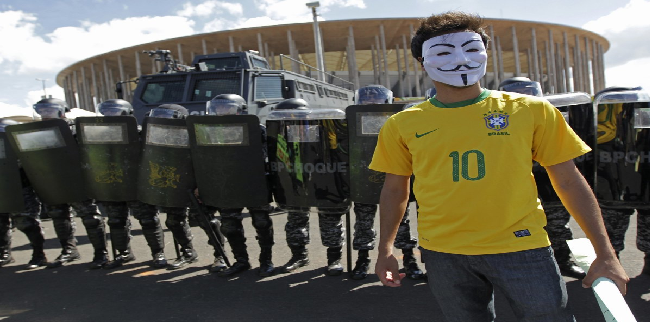Authorities in Brazil are betting that the 2 largest sporting events, FIFA World Cup 2014 and the Summer Olympics 2016 in Rio De Janeiro will help jump-start the World’s 6th largest economy. The two events will require an estimated and combined 30 billion dollars and are expected to generate 3.6 million short and long-term jobs. “I always see various North American and European companies interested in managing these stadiums. All these stadiums are designed for multi-user arenas and not just soccer pitches” says Brazil’s Sport’s Minister Aldo Rebelo. For a country that has remained a dominant figure in the game of football, Brazil truly deserves to host this large-scale event and make an effort to further improve its economy with an average annual GDP growth of 5 percent.
Doubts…
For many years, Brazil has seen its share of corruption and poor quality of living. A 30 billion dollar project requires more from the tax-payer, a spark in the cost of public services, and an extra weight on the poor who make up the majority of the nation. Recently, thousands of Brazilians took to the streets protesting against the World Cup and fully convinced that despite the wave of tourists about to hit their Nation, in the long-run, the event will ultimately benefit the questionable government and not the people. These accusations became a reality after Brazilian President Dilma Rousseff was booed alongside FIFA President Sepp Blatter at the opening ceremony on Saturday. “We have been suffering for too many years,” says Tainara Freitas, a teacher who has remained active in the protests, “They are looking out for people outside the country, they aren’t looking out for us, for the poor people. “ 
A look back at South Africa
Witnessing Africa’s first World Cup ever in history, we can analyze facts and figures that determined whether the people of South Africa really benefited or not. Furthermore, we can use these stats to project the results of the Brazilian economy post World Cup. After the release of a post-World Cup report from South African Sports Minister, Fikile Mbalula, evident infrastructural development has become an indication to the positive impact of hosting the World Cup. We have to keep in mind that hosting a large-scale event like the World Cup or Olympics does not only require the construction of world-class stadia; a government is forced accommodate all factors in between whether it may be improving road conditions and airports, building new hotels, or renovating existing retail stations; Wouldn’t these factors ultimately benefit the Brazilian public long after the stadiums are cleared, and the tourists return back home? 





